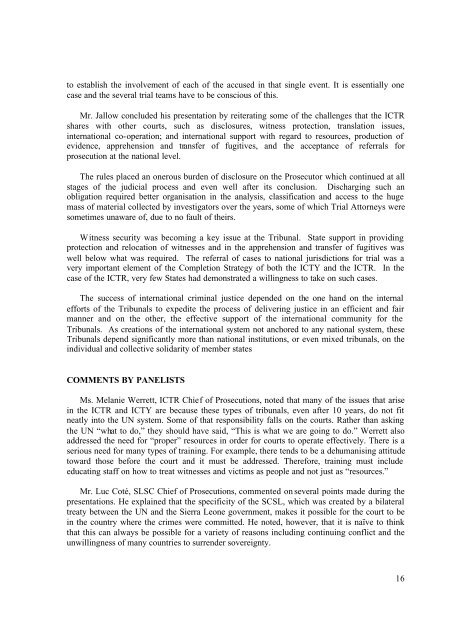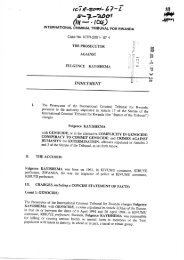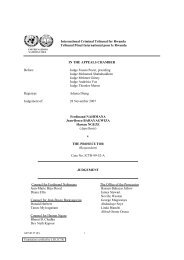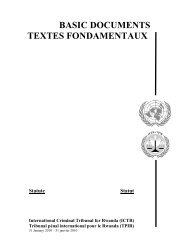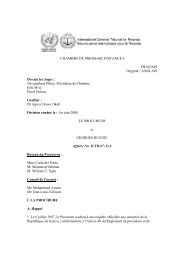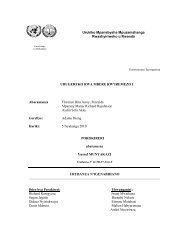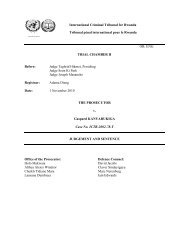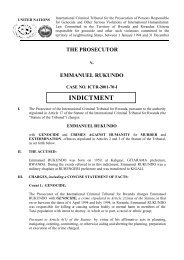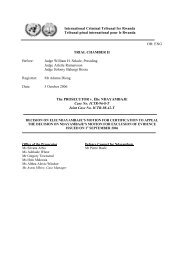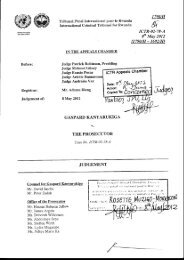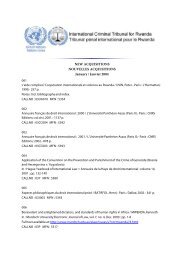Report of Proceedings - International Criminal Tribunal for Rwanda
Report of Proceedings - International Criminal Tribunal for Rwanda
Report of Proceedings - International Criminal Tribunal for Rwanda
You also want an ePaper? Increase the reach of your titles
YUMPU automatically turns print PDFs into web optimized ePapers that Google loves.
to establish the involvement <strong>of</strong> each <strong>of</strong> the accused in that single event. It is essentially one<br />
case and the several trial teams have to be conscious <strong>of</strong> this.<br />
Mr. Jallow concluded his presentation by reiterating some <strong>of</strong> the challenges that the ICTR<br />
shares with other courts, such as disclosures, witness protection, translation issues,<br />
international co-operation; and international support with regard to resources, production <strong>of</strong><br />
evidence, apprehension and transfer <strong>of</strong> fugitives, and the acceptance <strong>of</strong> referrals <strong>for</strong><br />
prosecution at the national level.<br />
The rules placed an onerous burden <strong>of</strong> disclosure on the Prosecutor which continued at all<br />
stages <strong>of</strong> the judicial process and even well after its conclusion. Discharging such an<br />
obligation required better organisation in the analysis, classification and access to the huge<br />
mass <strong>of</strong> material collected by investigators over the years, some <strong>of</strong> which Trial Attorneys were<br />
sometimes unaware <strong>of</strong>, due to no fault <strong>of</strong> theirs.<br />
Witness security was becoming a key issue at the <strong>Tribunal</strong>. State support in providing<br />
protection and relocation <strong>of</strong> witnesses and in the apprehension and transfer <strong>of</strong> fugitives was<br />
well below what was required. The referral <strong>of</strong> cases to national jurisdictions <strong>for</strong> trial was a<br />
very important element <strong>of</strong> the Completion Strategy <strong>of</strong> both the ICTY and the ICTR. In the<br />
case <strong>of</strong> the ICTR, very few States had demonstrated a willingness to take on such cases.<br />
The success <strong>of</strong> international criminal justice depended on the one hand on the internal<br />
ef<strong>for</strong>ts <strong>of</strong> the <strong>Tribunal</strong>s to expedite the process <strong>of</strong> delivering justice in an efficient and fair<br />
manner and on the other, the effective support <strong>of</strong> the international community <strong>for</strong> the<br />
<strong>Tribunal</strong>s. As creations <strong>of</strong> the international system not anchored to any national system, these<br />
<strong>Tribunal</strong>s depend significantly more than national institutions, or even mixed tribunals, on the<br />
individual and collective solidarity <strong>of</strong> member states<br />
COMMENTS BY PANELISTS<br />
Ms. Melanie Werrett, ICTR Chief <strong>of</strong> Prosecutions, noted that many <strong>of</strong> the issues that arise<br />
in the ICTR and ICTY are because these types <strong>of</strong> tribunals, even after 10 years, do not fit<br />
neatly into the UN system. Some <strong>of</strong> that responsibility falls on the courts. Rather than asking<br />
the UN “what to do,” they should have said, “This is what we are going to do.” Werrett also<br />
addressed the need <strong>for</strong> “proper” resources in order <strong>for</strong> courts to operate effectively. There is a<br />
serious need <strong>for</strong> many types <strong>of</strong> training. For example, there tends to be a dehumanising attitude<br />
toward those be<strong>for</strong>e the court and it must be addressed. There<strong>for</strong>e, training must include<br />
educating staff on how to treat witnesses and victims as people and not just as “resources.”<br />
Mr. Luc Coté, SLSC Chief <strong>of</strong> Prosecutions, commented on several points made during the<br />
presentations. He explained that the specificity <strong>of</strong> the SCSL, which was created by a bilateral<br />
treaty between the UN and the Sierra Leone government, makes it possible <strong>for</strong> the court to be<br />
in the country where the crimes were committed. He noted, however, that it is naïve to think<br />
that this can always be possible <strong>for</strong> a variety <strong>of</strong> reasons including continuing conflict and the<br />
unwillingness <strong>of</strong> many countries to surrender sovereignty.<br />
16


